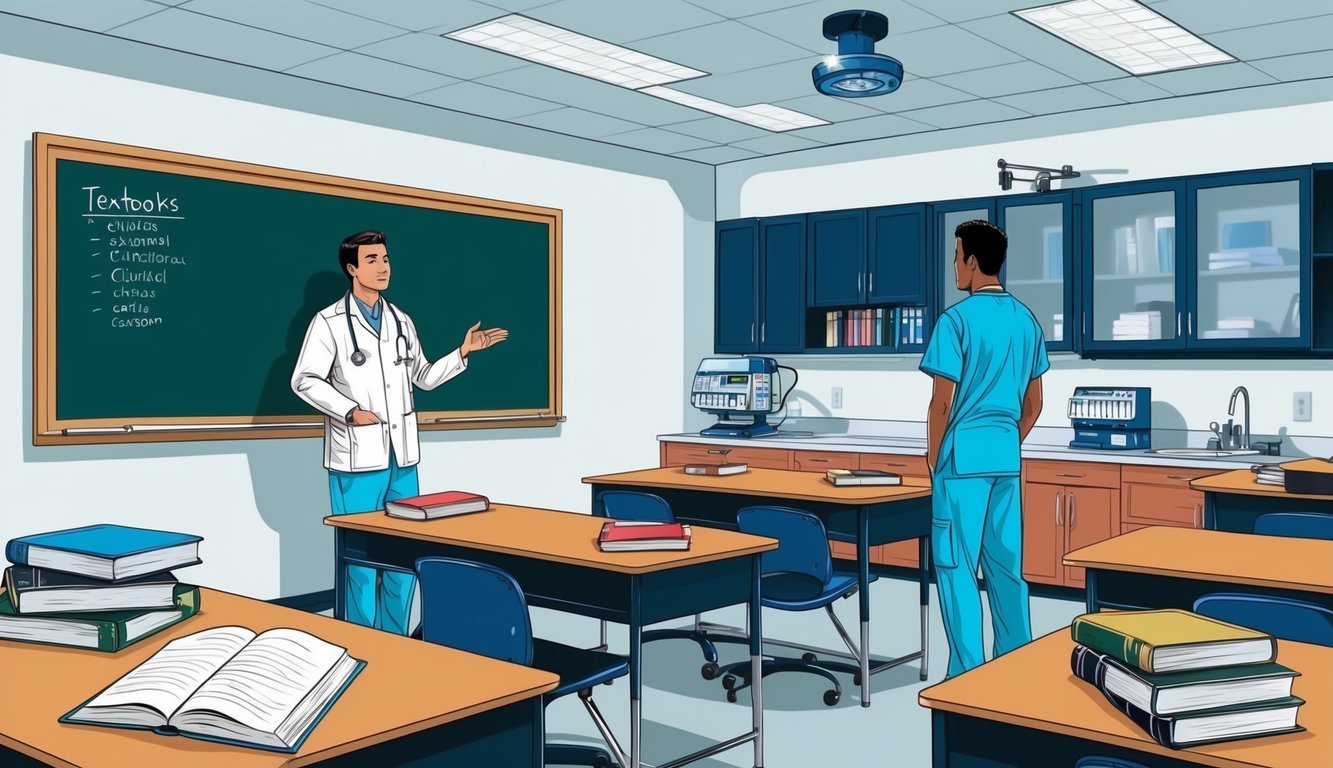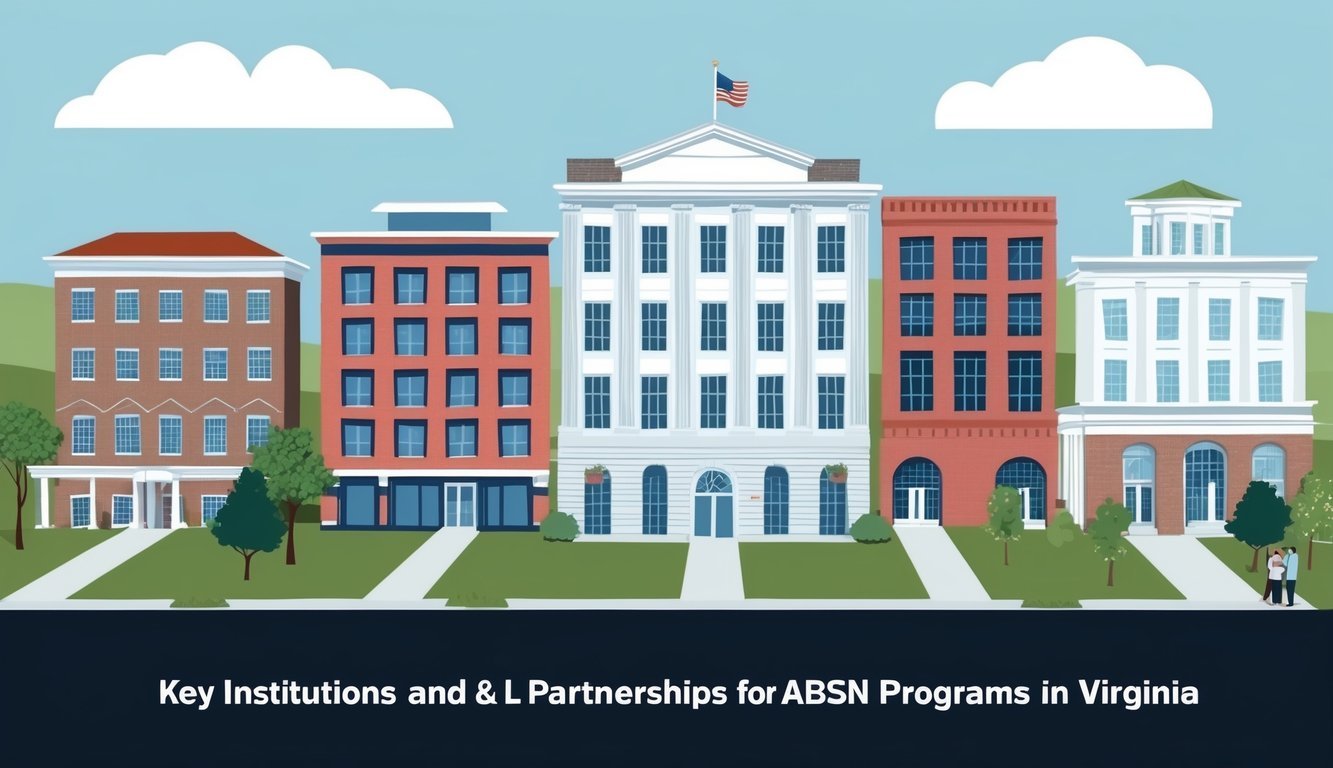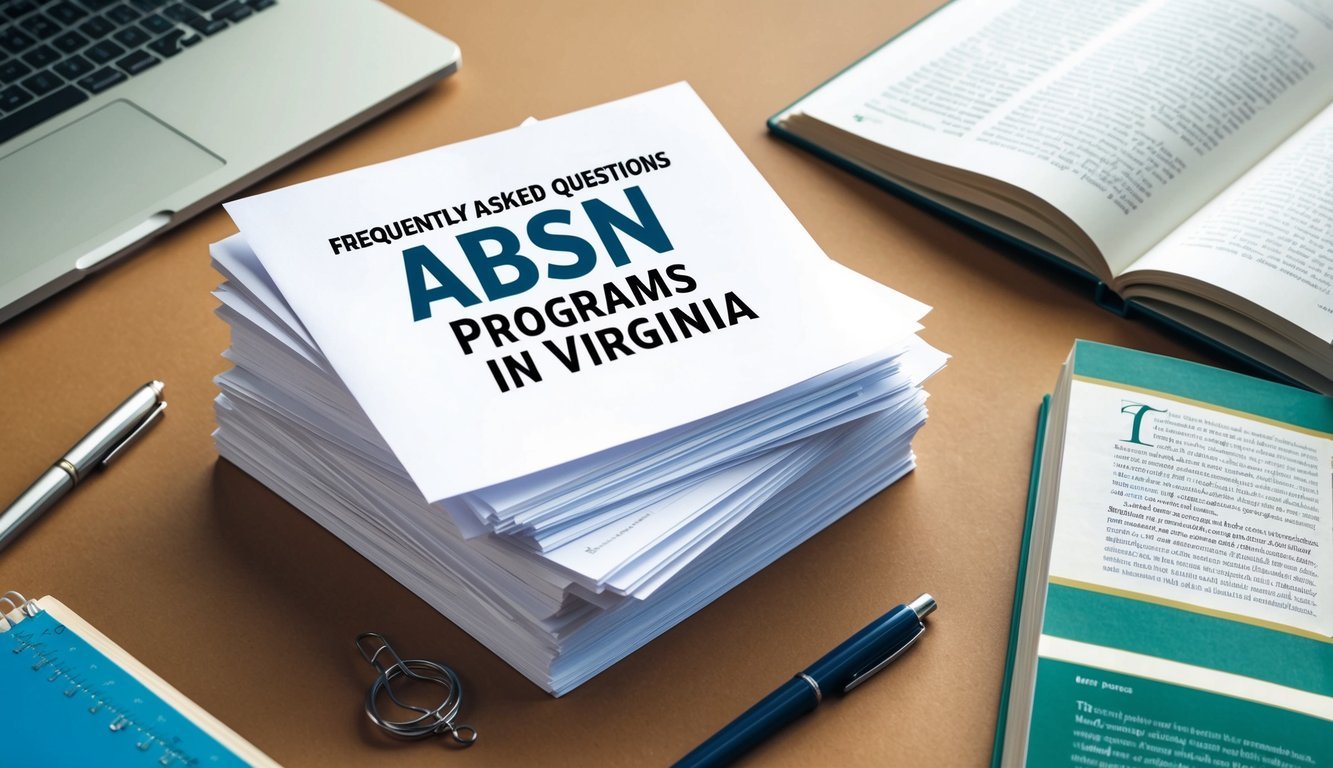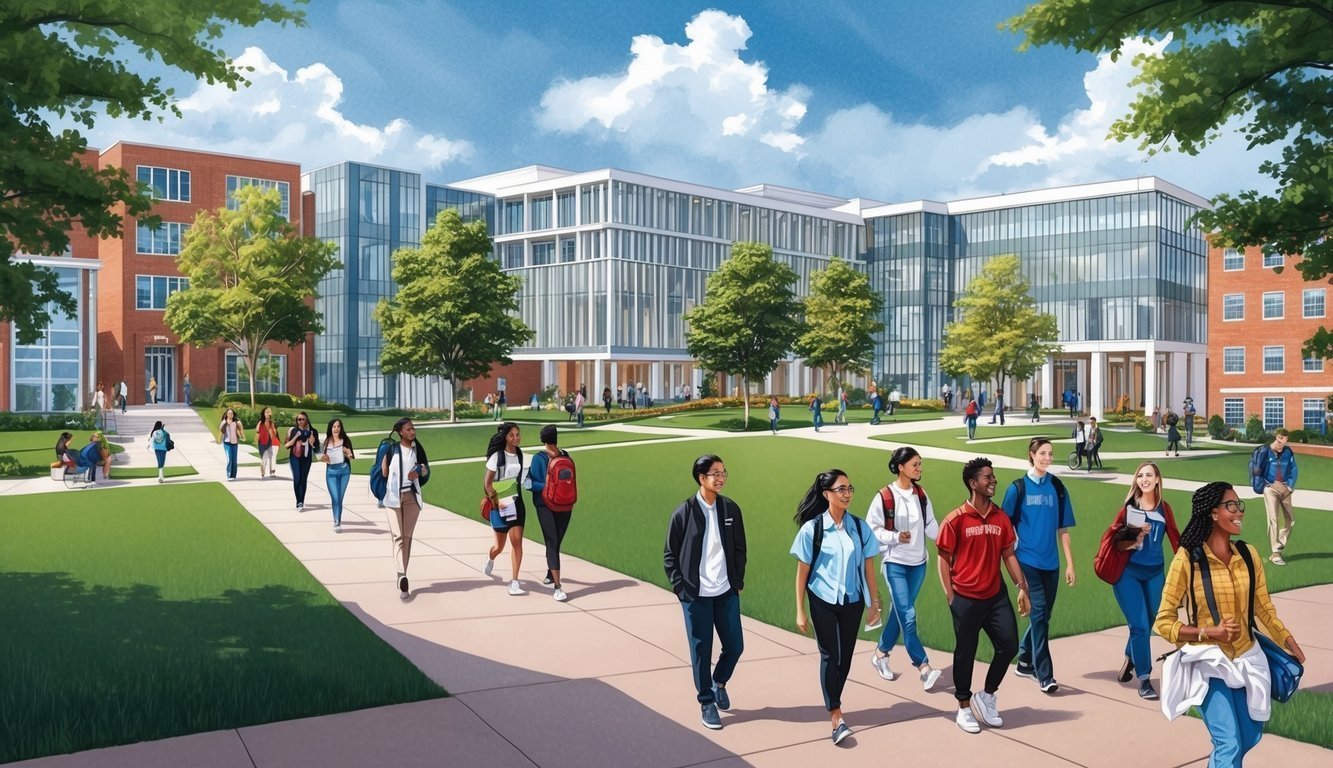Virginia’s Accelerated Bachelor of Science in Nursing (ABSN) programs offer a fast track for those looking to enter the nursing field quickly.
You can earn your nursing degree in as little as 16 to 24 months through these programs.
They prepare you for a rewarding career as a Registered Nurse.
With a blend of online coursework and hands-on clinical experiences, ABSN programs cater to your busy schedule while ensuring you receive ample training.
The demand for qualified nurses continues to rise.
So, choosing the right ABSN program is crucial.
Virginia boasts various esteemed institutions, some of which offer unique partnerships and scholarships to make your journey more affordable.
Exploring these options will help you not only meet the admission requirements but also gain insights into the curriculum and opportunities available post-graduation.
Investing in your education today can lead to a fulfilling career in nursing tomorrow.
Understanding the landscape of ABSN programs in Virginia can set you on the path to becoming a compassionate healthcare provider.
Key Takeaways
- ABSN programs empower you to earn your nursing degree quickly.
- Institutions in Virginia offer various financial aid options and partnerships.
- High-quality curriculum and clinical experiences prepare you for a nursing career.
Understanding ABSN Programs
ABSN programs, or Accelerated Bachelor of Science in Nursing programs, are designed for individuals who want to enter the nursing field more quickly.
They combine rigorous coursework with clinical practice, allowing you to earn your nursing degree in a shorter time frame compared to traditional programs.
Definition and Scope
An Accelerated Bachelor of Science in Nursing program is a fast-paced educational route that usually takes 12 to 18 months to complete.
These programs cater to students who already hold a non-nursing bachelor’s degree or have completed a significant number of college credits in non-nursing subjects.
The curriculum is intense, focusing on critical nursing skills, medical knowledge, and patient care.
Students engage in both online coursework and in-person clinical experiences, which prepare them for real-world nursing demands.
Many programs require around 66 credit hours, emphasizing subjects such as pharmacology, health assessment, and ethics in nursing.
Difference Between ABSN and Traditional BSN
The key difference between ABSN and traditional Bachelor of Science in Nursing (BSN) programs is the duration and pace.
A traditional BSN typically takes four years and includes general education courses alongside nursing classes.
In contrast, ABSN programs concentrate solely on nursing, allowing you to complete your studies in a fraction of the time.
This full-time program often requires a more intense commitment, as the coursework is condensed into a shorter timeframe.
This accelerated approach is ideal for those looking to make a career switch into professional nursing quickly.
Here’s a quick comparison:
| Feature | ABSN Programs | Traditional BSN |
|---|---|---|
| Duration | 12-18 months | 4 years |
| Eligibility | Bachelor’s degree or 60 credits | High school diploma or GED |
| Focus | Nursing only | Nursing and general education |
| Clinical Experience | Integrated with coursework | Included but spread out |
Choosing the right program depends on your personal circumstances and career goals.
Admission Requirements for ABSN Programs in Virginia
When considering ABSN programs in Virginia, it’s essential to be aware of specific admission requirements.
These include academic prerequisites, minimum GPA, letters of recommendation, and the interview process.
Each of these components plays a crucial role in preparing you for acceptance into the program.
Academic Prerequisites
Most ABSN programs in Virginia require that you hold a bachelor’s degree in any field.
You also need to complete certain prerequisite courses before applying.
Commonly required courses include:
- Human Anatomy and Physiology
- Microbiology
- Statistics
- General Psychology
Make sure your prior coursework meets the standards of the program you are applying to.
Each school may have unique requirements, so it’s best to check with the specific institution for an exact list.
Minimum GPA
Many ABSN programs have a minimum GPA requirement that you must meet for admission.
Typically, a GPA of 3.0 on a 4.0 scale is common, though some programs may require a higher GPA.
Competitive programs might favor candidates with GPAs above 3.5.
Your GPA in prerequisite courses may also be scrutinized, so aim for excellence.
Programs may evaluate grades in science courses more rigorously since they are important for nursing education.
Letters of Recommendation
You will often need to provide two to three letters of recommendation as part of your application.
These should ideally come from:
- Professors or academic advisors who are familiar with your academic abilities.
- Employers or supervisors who can speak to your work ethic and character.
When selecting recommenders, consider those who understand your capabilities in a professional or educational context.
Interview Process
Some ABSN programs will require an interview as part of the admission process.
This step allows the admissions committee to assess your fit for the program.
Be prepared to discuss:
- Your motivation for pursuing nursing.
- Your understanding of the nursing profession.
- Life experiences that have influenced your decision to enter this field.
Practicing common interview questions can help you feel more confident during this step.
Each program’s interview format can vary, so it’s beneficial to inquire about specifics in advance.
Curriculum and Clinical Experience

The ABSN programs in Virginia offer a comprehensive curriculum designed to equip you with essential nursing knowledge and practical skills.
The combination of core courses, specialized studies, clinical rotations, and simulation labs ensures you are well-prepared for a nursing career.
Core Nursing Courses
Your educational journey will begin with core nursing courses that cover fundamental topics.
You can expect to study Health Assessment, where you learn how to evaluate patients’ health status accurately.
Nursing Skills classes provide hands-on training in essential procedures, ranging from basic care to advanced techniques.
Other important subjects include Pharmacology, which addresses medication management, and Microbiology, focusing on pathogens and infection control.
These core classes are crucial as they establish your foundational knowledge, essential for all nursing practice areas.
Specialized Health Studies
Beyond core courses, specialized health studies delve into areas specific to patient care.
Topics like Pediatrics and Obstetrics prepare you for working with mothers and children in various health settings.
Also, you’ll study Mental Health Promotion, which emphasizes the importance of psychological well-being in patient care.
The curriculum often includes Community Health, highlighting the role of nurses in public health initiatives.
Developmental Psychology provides insights into patient behavior across different life stages, aiding in holistic care.
Together, these studies enhance your understanding of diverse patient needs.
Clinical Rotations
Clinical rotations are a key component of the ABSN curriculum, offering you real-world experience in various healthcare settings.
You will complete rotations in areas like Surgical Nursing, where you’ll participate in pre- and post-operative care.
In Psychiatric Nursing, you’ll learn to support patients with mental health conditions.
These hands-on experiences are critical for applying classroom knowledge to practice.
During rotations, you work alongside experienced nurses, gaining valuable insights and skills.
These experiences prepare you for the complexities of patient care in various environments.
Simulation Labs
Simulation labs provide a safe environment for practical learning.
In these labs, you can practice critical nursing skills using high-fidelity manikins that mimic real patient responses.
This ensures you become familiar with essential techniques before working with actual patients.
You’ll engage in scenarios that cover various aspects of nursing, from emergency situations to routine check-ups.
This hands-on learning approach enhances your confidence and competence.
The lab experience allows for immediate feedback, which is essential for your growth as a nursing professional.
Evaluating Program Outcomes

When considering Accelerated Bachelor of Science in Nursing (ABSN) programs in Virginia, two key factors stand out: NCLEX-RN pass rates and employment success.
These aspects are crucial for determining the effectiveness of a program and your future opportunities in nursing.
NCLEX-RN Pass Rates
The NCLEX-RN exam is a significant milestone for nursing graduates, as it assesses your readiness to practice safely as a registered nurse.
A high NCLEX-RN pass rate indicates the quality of the program’s training.
| Program | NCLEX-RN Pass Rate |
|---|---|
| Eastern Mennonite University | 92% |
| Averett University | 90% |
| Duke University | 95% |
Many programs focus on preparing you for this exam through rigorous coursework and simulation labs.
Reviewing the NCLEX-RN pass rates of prospective programs can help you gauge their effectiveness and support structures.
Employment Success
After passing the NCLEX-RN, securing a job is often the next priority for graduates.
Employment rates provide insight into how well a program prepares you for the job market.
| Program | Employment Rate |
|---|---|
| Norfolk University | 95% |
| Virginia Commonwealth University | 88% |
| James Madison University | 90% |
High placement success rates are critical as they reflect the demand for graduates from specific programs.
Networking opportunities, internships, and career services can enhance your chances of finding a job after graduation.
Programs that offer robust job placement support can make a difference in your career journey.
Financial Considerations

When pursuing an Accelerated Bachelor of Science in Nursing (ABSN) program in Virginia, it is essential to understand the costs involved and the financial resources available to support your education.
This section focuses on tuition and fees as well as options for scholarships and financial aid that can help ease your financial burden.
Tuition and Fees
Tuition for ABSN programs can vary significantly among institutions in Virginia.
On average, you can expect to pay between $60,000 to $70,000 for the complete program.
Here’s a breakdown of typical costs:
| School Name | Estimated Tuition |
|---|---|
| Marymount University | $69,000 |
| Averett University | $69,000 |
| Eastern Mennonite University | Approximately $60,000 |
In addition to tuition, consider other fees such as textbooks, lab supplies, and resources for clinical rotations.
These costs can add another $2,000 to $5,000 to your budget.
Understanding these expenses can help you plan your finances better.
Scholarships and Financial Aid
Many nursing schools offer scholarships to help students finance their education.
These awards can be based on merit, need, or specific criteria like community service.
You should explore options such as:
- University-specific scholarships
- State and federal grants
- Private scholarships from nursing organizations
You can also apply for financial aid through the Free Application for Federal Student Aid (FAFSA).
This can provide access to grants, loans, and work-study options.
By checking with your chosen school’s financial aid office, you can learn more about available resources and how to apply for them.
You can also explore Nursing Education scholarships for further assistance.
Key Institutions and Partnerships

In Virginia, key institutions and their partnerships play a significant role in enhancing your education through strong support and clinical experiences.
Marymount University, with its solid nursing program, works closely with various healthcare settings.
These partnerships help you gain practical experience and engagement with diverse clinical environments.
Marymount University
Marymount University offers a competitive Accelerated Bachelor of Science in Nursing (ABSN) program.
The program emphasizes personalized learning and one-on-one mentorship, ensuring you receive ample support throughout your journey.
Key features of Marymount University’s ABSN program:
- Location: Arlington, Virginia
- Duration: 12-16 months
- Curriculum: A blend of online theory and in-person clinical practice
- Scholarships: Merit-based opportunities up to $10,000 for eligible students
The program’s commitment to diversity enriches your educational experience.
By incorporating various perspectives, Marymount fosters an environment of cultural competence essential for future nursing practice.
Clinical Placement Partnerships
The Clinical Placement Team at Marymount University ensures that you complete your clinical rotations in various reputable healthcare settings.
They connect you with hospitals, clinics, and long-term care facilities, where you will gain hands-on experience under the supervision of experienced professionals.
Areas of focus include:
- Supervised Rotations: Work alongside seasoned nurses in real-world settings.
- Healthcare Diversity: Exposure to diverse patient populations and healthcare approaches.
- Networking Opportunities: Build relationships with healthcare providers for future employment.
These partnerships equip you with practical skills while preparing you for a successful nursing career.
Each experience is carefully designed to meet educational objectives and provide you with comprehensive clinical training.
Frequently Asked Questions

This section provides answers to common questions regarding Accelerated Bachelor of Science in Nursing (ABSN) programs in Virginia.
You’ll find details about eligibility, top colleges, program durations, differences with traditional BSN programs, online versus on-campus comparisons, and available financial aid options.
What are the eligibility requirements for ABSN programs in Virginia?
To enroll in an ABSN program, you typically need a bachelor’s degree in a non-nursing field.
Most programs require a minimum GPA, often around 3.0.
Prerequisite courses in subjects like biology, chemistry, and statistics are usually mandatory.
Which colleges offer the best ABSN programs in Virginia?
Several colleges in Virginia are recognized for their ABSN programs.
Notable institutions include:
| College | Location | Program Length |
|---|---|---|
| Eastern Mennonite University | Harrisonburg | 15 months |
| Averett University | Norfolk | 16 months |
| Virginia Commonwealth University | Richmond | 12 months |
For a detailed list, you can review resources at Nursing Process.
How long does it typically take to complete an ABSN program in Virginia?
Most ABSN programs in Virginia take about 12 to 18 months to complete.
The duration often depends on the number of credits and clinical hours required.
Programs are designed to be intensive, allowing you to graduate quickly compared to traditional nursing programs.
What are the differences between traditional BSN programs and ABSN programs in Virginia?
ABSN programs are accelerated and focus on nursing theory and clinical practice, making them shorter in duration.
Traditional BSN programs usually take four years and include more general education courses.
ABSN programs are designed for individuals who have already completed a bachelor’s degree.
How do online ABSN programs in Virginia compare to on-campus programs in terms of accreditation and quality?
Online ABSN programs in Virginia must meet the same accreditation standards as on-campus programs.
Accreditation ensures quality education and prepares you for the NCLEX-RN exam.
Many online programs offer flexibility, letting you balance studies with other commitments.
What financial aid options are available for students enrolling in ABSN programs in Virginia?
Students in ABSN programs in Virginia may receive federal financial aid, scholarships, and grants.
Some programs also offer military discounts or specific scholarships for military families.
You should research your options and apply early to maximize your financial assistance.
You can find more details at Averett University related to tuition and financial support.

